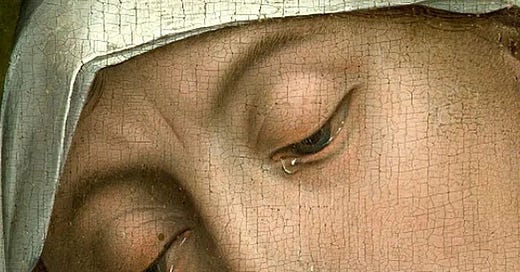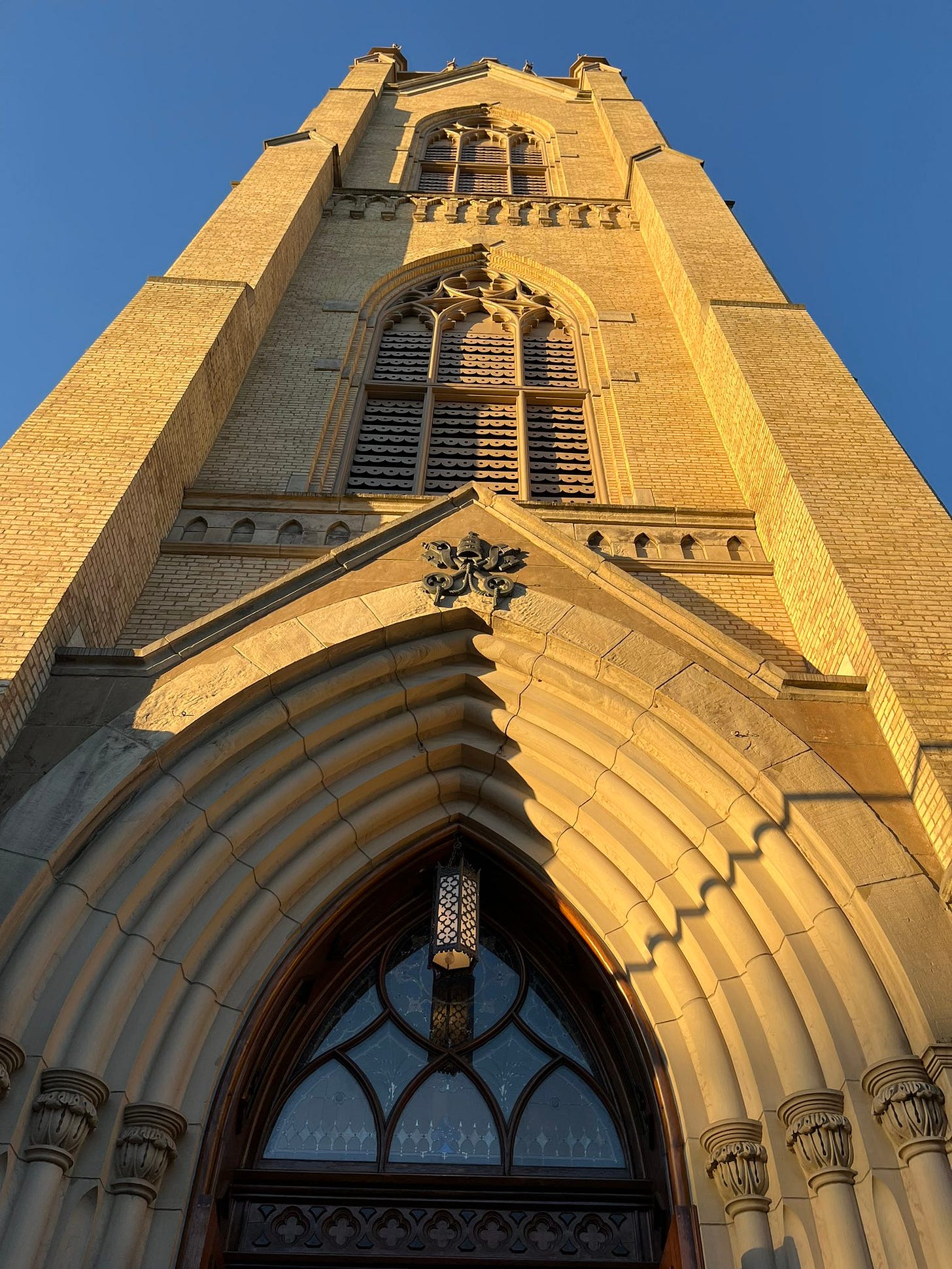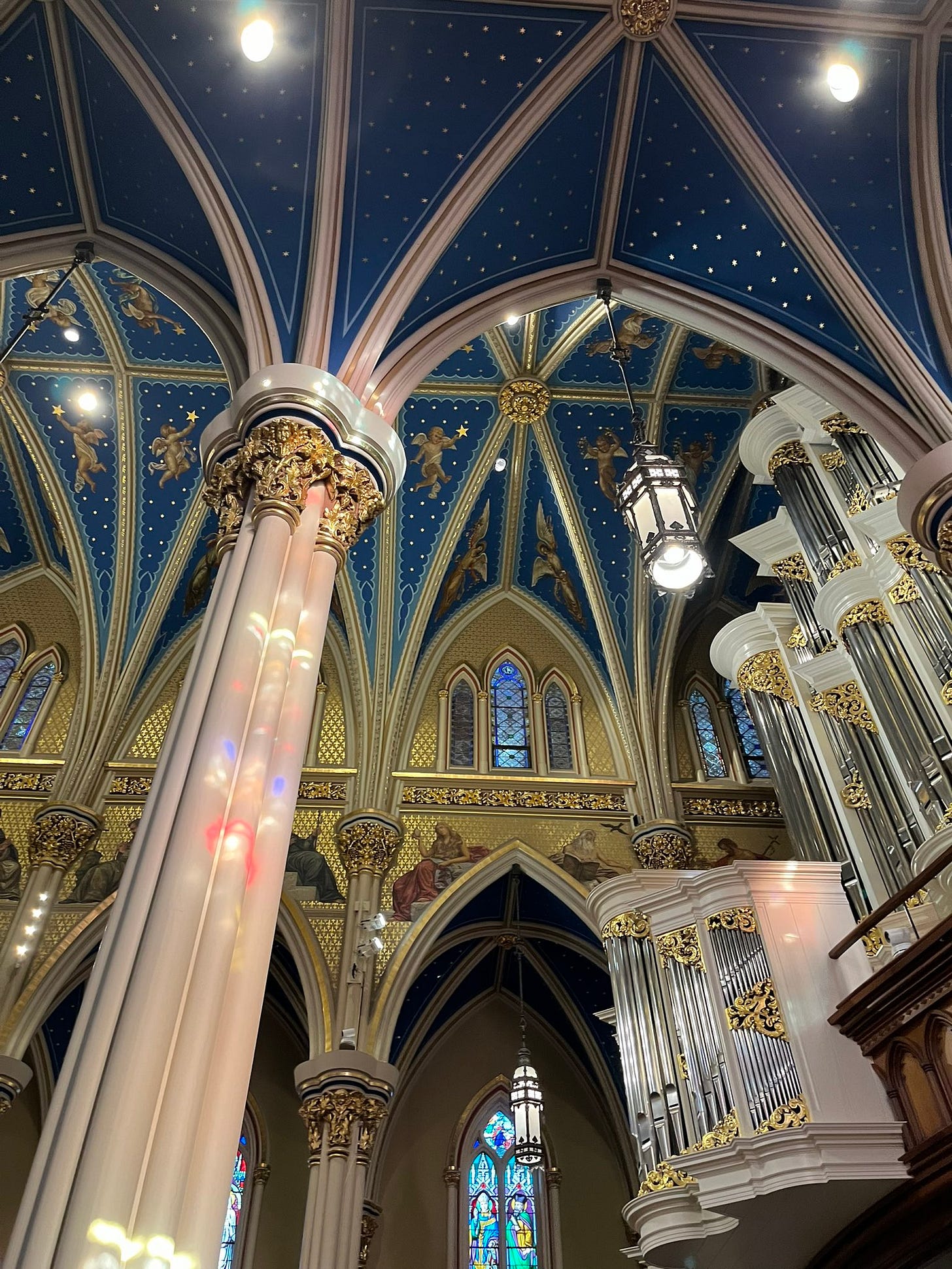An Update and A Fresh Poem: "The Hope of Tears"
And for those who would like, a few words about it.
Dear Friend,
First, my apologies that I have not been able to keep my usually-rigorous schedule here. I recently was honored to recieve a promotion within my division of HarperCollins, moving to a role as Executive Editor of Nelson Books. As I’m sure you can understand, that transition has been demanding, in a quite wonderful way of course, and my time for personal writing has been (temporarily) reduced. In the new role, I will enjoy serving a strong list of significant authors for our house, mostly of nonfiction and memoir, and acquiring world-class talent of strong creative and commercial possibility.
The new role and its attending calendar changes for me meant that I was able to attend the de Nicola Center for Ethics and Culture’s Fall Conference at Notre Dame. This was my second year at the conference, as last year I was able to share the short talk that eventually gave rise to The Rose Fire. It was a last minute choice to go this year, encouraged by the ever-wonderful Emily, but a delightful whirlwind. Highlights included remarkable keynotes from Judith Wolfe (especially outstanding), Dana Gioia, Ron Hansen, James Matthew Wilson, and Sally Thomas, and panels from many brilliant friends and acquaintances, all focused on the life of the imagination. Besides that, I enjoyed parties with friends, a fine lakeside walk, and great food (notably Notre Dame’s unforgettable Hogwarts-esque dining hall, and much later, a vast stack of quesadillas cooked for a packed room of writers by Yours Truly at like 1 AM or something dumb like that, accompanied by Woodford Reserve and Haribo Gold Bears).
The autumn weather was so perfect it felt like a dream, or like walking in an old movie. It was all the more happily haunted as we were there over Halloween and the Feasts of All Saints and All Souls.
A few views of the campus:
I also turned in the final edits of The Locust Years to my publisher. I’ll post a separate update, and a peek at the cover art, very soon here, with a couple fun hints at the extras to come as we move toward the launch of the book. It’s amazing to see this project come together—seen as a whole, I thinkit is by far the richest and best realized work that I have ever done.
In that spirit, here is a (VERY short) fresh poem from the collection, along with some thoughts on it for my (ever wonderful!) paid subscribers.
The Hope of Tears
We see the world with half-formed eyes and think
The world half-formed; that night falls when we blink.
Tears may wash the lens; the wise man’s light
Is salt and hot, and makes each shadow bright.
An epigram is a short observation, often in verse, intended to stick with us. While often the domain of humorists or aphorists (Martial, Ben Franklin, Oscar Wilde and Mark Twain being a few immortal masters of this), poets from Sappho to J.V. Cunningham have found ways to stretch and adapt the form to suit their own tastes and settings.
The great strength of an epigram is the fact that it may be so easily overlooked. When an epigram is well-made, it seems obvious. (“A penny saved is a penny earned!”) The listener shrugs, perhaps rolls the eyes at Gramps. But the work is already done. The sliver has slipped under the skin, so small it can’t even be felt. But it’s there now, and you see things with it in you, and you think things with it in you, and sooner or later you will hear those words coming in slow motion out of your own mouth, or find yourself suddenly contemplating some little word picture without even being able to remember when it entered your psyche.
This poem is formed of two rhymed couplets of iambic pentameter. It can hardly be more simple. But there is a big thought in these little words. It was inspired when, on a walk in the early morning, I chuckled at the idea of some loveable simpleton who thought that night fell every time he blinked, thus experiencing dawn every four or five seconds. From there, I thought of a hypothetical friend of this gentle idiot, (sort of an Obstinate to the simpleton’s Pliable), someone who loudly insisted that his eyesight was perfect, thank you, and it was the damn trees that had gotten so damn blurry. These two conditions seem to me to be quite closely related. Someone who cannot imagine that there is a world larger than the confines of their head will begin to fail to see in all kinds of ways. (Let the reader understand.)
But what could be done in such a case? If someone is so stupid or so stuck as to define the world by the flaws in their vision, what can be done for such a person? Really, not very much. This is, I think why one of the great recurring exasperations of Christ of the people around him is this holy gripe: they have eyes but they do not see.
In this case, the only hope of a fix is to cry. Really. Just to cry. To cry in the right way. Not out of self-pity, although even that can mean that all is not lost, but out of a mourning that one is not well, and a desire to live in the world as it is, perhaps for the first time. Maybe tears of this kind are not only an evidence of an inner turning (“repentance” is the camp-meeting term), but the actual means of that transformation. To cry is to integrate the soul. The body and the spirit are unified. You cannot force real tears. You cannot hold them back. It is your good body bringing forth the elemental holy water (holy water in the old Christian tradition contained blessed salt). It is a sort of washing, a cleansing of the lenses of perception.
To escape the imprisioning limits of our own eyes, we must, I think, be led by our tears. Not by right thinking (later is fine for that), nor yet by right action (how can you do what is right if you still think that it’s the trees that have gone blurry?), but by the sort of hope that comes, only, to the person who is crying, honestly, and in the right way. It will come as it will come, and like good rain or a high tide, it will wash things a bit cleaner. It will help us see.
That is, I suppose, enough for now. It would be a pity to ruin a decent epigram with too many words, though I suppose I did that several paragraphs ago.
Here is to the hope of tears.









I'm very glad I found you… or you found me? Mysteries of the Internet. I write a lot of poetry myself and I've just begun to contemplate putting some of it in the public domain. I appreciate what I have read of you so far.
Congratulations on the new job position also! Amazing!!!